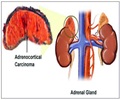Scientists have developed the first humanized mouse model for a rare hereditary condition.

Congenital Adrenal Hyperplasia: A Collection of Hereditary Diseases
Congenital adrenal hyperplasia (CAH) is a collection of hereditary diseases that affects approximately one in every 15,000 births.Mutations in the CYP21A2 gene cause the adrenal glands - a pair of tiny organs placed atop the kidneys - to generate low levels of cortisol and excessive amounts of androgen hormones such as testosterone in the most common form, known as 21-hydroxylase deficiency.
This results in early puberty, girls with male appearance, and a variety of health complications. Currently, steroid hormone replacement therapy is used for treatment, but this may often have harmful side effects.
In this study, researchers from the University Hospital Carl Gustav Carus in Dresden, Germany, replaced the gene Cyp21a1 in mice with the human gene CYP21A2 carrying a mutation.
They found that the genetically modified mice at 20 weeks had enlarged adrenal glands while expressing the human mutated gene.
In addition, similarly to the human disease, the mutation caused both male and female mice to have low levels of corticosterone – the main stress hormone in mice that is the equivalent to cortisol in humans – and other hormonal imbalances.
Advertisement
Humanized mouse models to study human diseases
Go to source).
Mice Mimic Congenital Hyperplasia Symptoms; Paving way for Further Studies
“Our mice accurately mimic the symptoms seen in human patients,” said lead author Shamini Ramkumar Thirumalasetty. “For example, the female mutant mice also have issues with fertility, which we believe is most probably due to the hormonal imbalances triggered by congenital adrenal hyperplasia.”This mouse model will now allow the team to study the mechanisms of the disease and find the most effective treatments.
Advertisement
Reference:
- Humanized mouse models to study human diseases - (https://pubmed.ncbi.nlm.nih.gov/20150806/)
Source-Eurekalert















